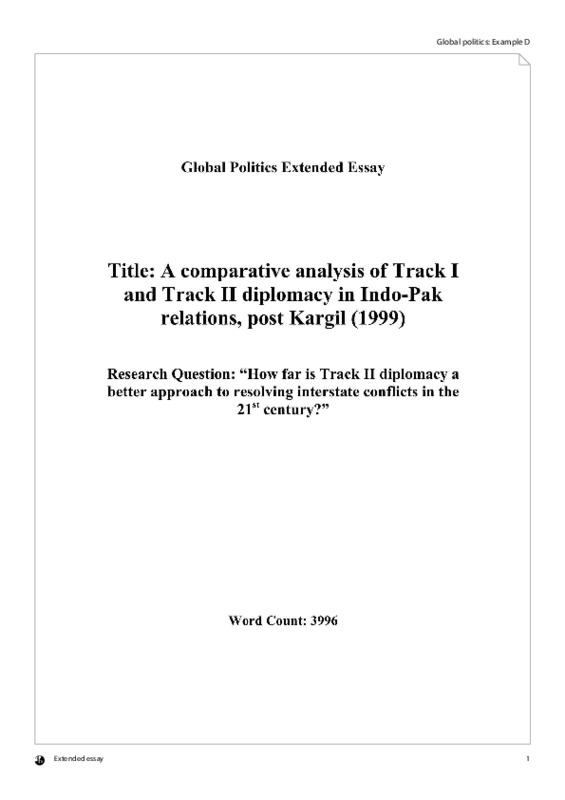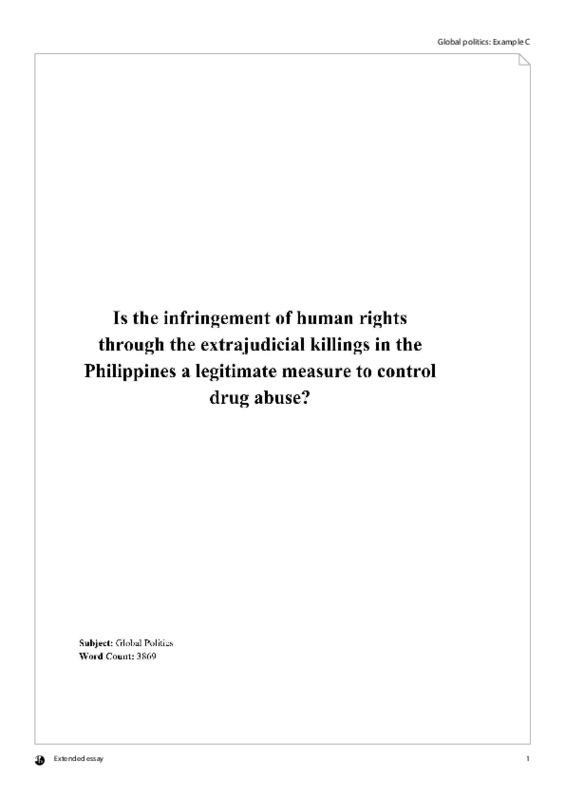EE Guide
EE Example/ marks 30/34
Extended Essay example. marked 30/ 34
EE Assessment details on example C
| Assessment details | |||
|---|---|---|---|
| Criterion | Mark awarded | Commentary | |
|
A: Focus and method [Maximum possible mark: 6] |
6 |
The topic is communicated accurately and effectively. Identification and explanation of the research topic is effectively communicated; the purpose and focus of the research is clear and appropriate. Even though the essay has not got a title (it always helps) in the introduction, the topic is clearly communicated. The research question is clearly stated and focused. The research question is clear and addresses an issue of research that is appropriately connected to the discussion in the essay. The research question by itself is not complete, but in the introduction the student introduces more global politics key concepts and an international insight of the research question. Methodology of the research is complete. An appropriate range of relevant sources and methods has been selected in relation to the topic and research question. There is evidence of an effective and informed selection of sources and methods. The student shows the importance of using global politics key concepts to address the topic and there is evidence of an informed selection of sources (critical view of biased sources). The criterion is not perfectly achieved but we used positive marking and gave it the maximum marks here. |
|
|
B: Knowledge and understanding [Maximum possible mark: 6] |
6 |
Knowledge and understanding are excellent. The application of source materials is clearly relevant and appropriate to the research question. Knowledge of the topic and global politics is clear and coherent and sources are used effectively and with understanding. The student relates his/her investigation to three main global politics key concepts—legitimacy (present in the research question), sovereignty and power. Concepts are properly defined and referenced. These key concepts are not isolated in the essay but linked to the facts. In the bibliography not all the sources are about the Philippines, but there are some about global politics, which is correct. These theoretical sources are used along the essay. Use of terminology and concepts is good. The use of terminology and concepts is accurate and consistent, demonstrating effective knowledge and understanding of global politics. As previously stated, terminology and concepts are well used in the essay. Vocabulary is global politics related. |
|
|
C: Critical thinking [Maximum possible mark: 12] |
10 |
The research is excellent. The research is appropriate to the research question and its application to support the argument is consistently relevant. Even though it could have been better, the research is great for a global politics extended essay. There are sources related to the situation in the Philippines, sources of human rights violations in the Philippines and sources (though these could have been better) of key concepts of global politics. Analysis is excellent. Conclusions to individual points of analysis are effectively supported by the evidence. Even though I do not agree with everything here, the conclusions are supported. Discussion/evaluation is excellent. An effective and focused reasoned argument is developed from the research with a conclusion reflective of the evidence presented. Even with flaws, the argument of the essay is excellent. Sometimes further theoretical background would have been better to build a proper argument. This reasoned argument is well structured and coherent; any minor inconsistencies do not hinder the strength of the overall argument or the final or summative conclusion. The research has been critically evaluated. Sources are evaluated in the introduction. |
|
|
D: Presentation [Maximum possible mark: 4] |
3 |
Presentation is good. The structure of the essay clearly is appropriate in terms of the expected conventions for the topic, the argument and subject in which the essay is registered. Layout considerations are present and applied correctly. Flaws: the title is missing; the bibliography is not visually complete; references are missing (but this is not evaluated in this criterion); the essay should be flagged for lack of references. |
|
|
E: Engagement [Maximum possible mark: 6] |
5 |
Engagement is excellent. Reflections on decision-making and planning are evaluative and include reference to the student’s capacity to consider actions and ideas in response to challenges experienced in the research process. The student considered using global politics key concepts from the beginning. These reflections communicate a high degree of intellectual and personal engagement with the research focus and process of research, demonstrating authenticity, intellectual initiative and/or creative approach in the student voice. |
|
| Total marks awarded | 30/34 | ||
EE Guide
Choice of topic
In the Diploma Programme global politics course, a political issue is defined as:
“Any question that deals with how power is distributed and how it operates within social organization, and how people think about, and engage in, their communities and the wider world on matters that affect their lives.”
Hence, there is a wide range of questions that are in principle suitable for an EE in global politics. Students must narrow their initial topic ideas to a concise question that can be researched effectively within the EE’s 4,000-word scope.
EEs in global politics may focus on topics that invite a local to global level of analysis, or on any level in between. Sometimes, it may be interesting to investigate how the same political issue unfolds at different levels of analysis.
The benefit of undertaking research that investigates issues at a global level is the availability of secondary data. Research at a local level may be more effectively investigated using primary methods.
In addition to levels of analysis, different theoretical foundations or the perspectives of varying groups of people or individuals on a political issue may help students to formulate a clear and focused research question.
“Contemporary” ruleThe topic students choose must be contemporary. Contemporary here is taken to refer to events during the student’s lifetime.
References to historical events and issues can be included if they:
- provide useful background context
- are necessary for understanding a topic
- have clear implications for the present.
However, the emphasis of the essay should be on current affairs. Similarly, students should not base their essay on future events, as in this case it will become speculative and unsupported.
When choosing a topic, students and supervisors must ensure that the various assessment criteria can be satisfied within the word limit. Students are advised to avoid topics that are too broad in scope to permit an in-depth study within the prescribed word limit.
Examples of topicsThese examples are for guidance only. Students must ensure their choice of topic is focused (left-hand column) rather than broad (right-hand column).
 Focused topics Focused topics |  Broad topics Broad topics |
|---|---|
| A comparison of how the Hong Kong protests of late 2014 were portrayed in the official media in Singapore versus the reporting undertaken by NGOs X, Y and Z active in Singapore | The influence of 2014 Hong Kong protests on Singapore |
| The influence of the election success of Syriza in Greece on the campaign and outcomes of the 2015 parliamentary election in Spain | How populist political parties have changed the political landscape in Europe |
| An evaluation of the ability of Mexican migrants to achieve a political voice in county X in Arizona | How Mexican migration has changed the politics of the US |
EE: Treatment of the Topic
Treatment of the topic
EEs in global politics will often be interdisciplinary in terms of subject matter and research approach and may use both primary and secondary sources.
Essays that rely on secondary sources only are perfectly valid, but students must engage critically with the sources of information that they use.
The topic and chosen level(s) of analysis will suggest the appropriate theoretical perspectives and methodological approaches.
Various approaches to the research are possible, such as:
- case studies
- comparative studies
- analyses of discourse.
Relevant techniques for gathering and interpreting evidence include:
- interviews
- literature or media reviews
- quantitative data analysis.
Students may use journalistic or visual material, interviews or data from popular and social media, but their essay should not be based solely on such sources.
Theoretical underpinningStudents must show that they have grounding in theories and methods of global politics and are able to use these appropriately and effectively in order to develop a reasoned argument.
The essay is a formal research essay that examines contemporary political issues, and may do so from an angle previously unfamiliar to the student. For example:
- Students interested in a more theoretical approach to political issues can examine the key concepts of global politics in a way that is more anchored in academic debates.
- Students interested in statistics that underpin decision-making and perceptions in global politics can undertake more comprehensive data analysis.
Once students have identified their topic and written their research question, they can decide how to research their answer. They may find it helpful to write a statement outlining their broad approach. These examples are for guidance only.
| Topic | Influence of “big data” on election campaign tactics: the case of the Obama 2012 campaign |
|---|---|
| Research question | To what extent should we be worried about the use of “big data” in election campaigns? The case of the Obama 2012 campaign. |
| Approach |
|
| Topic | A comparative study of migration from rural areas into cities in Australia and Indonesia |
|---|---|
| Research question | To what extent are the ideological and practical forces that drive urbanization global instead of nation-specific? A comparison of the political rhetoric, government policies and impact of global forces in driving migration from rural areas into cities in Australia and Indonesia. |
| Approach |
|
| Topic | Evolution in the Russia–China relationship during and after the 2014–15 Ukraine crisis |
|---|---|
| Research question | To what extent is the evolution in the Russia–China relationship during and after the 2014–15 Ukraine crisis evidence that a realist view on international politics still has applicability? |
| Approach |
|
Students must ensure that their EE does not overlap significantly with any other work they are submitting for the Diploma Programme. For example, the engagement activity and higher level extension tasks might give students ideas and inspiration for their EE but they must not examine the same political issue.
The global politics EE and IAIn particular, an EE in global politics is not an extension of the internal assessment tasks—the engagement activity (SL and HL students) and the HL extension (HL students only)—for the subject. Students must ensure that they understand the differences between the two.
- The engagement activity task is based primarily on experiential learning, whereas the EE in global politics is a formal research essay relying primarily on secondary sources.
- Although the HL extension task and the EE in global politics are both based primarily on secondary sources, the HL extension task is directed towards an oral end product, whereas the EE in global politics culminates in a comprehensive written task.
Supervisors play an important role here in guiding students on these distinctions. Students risk their diploma if academic misconduct is found.



